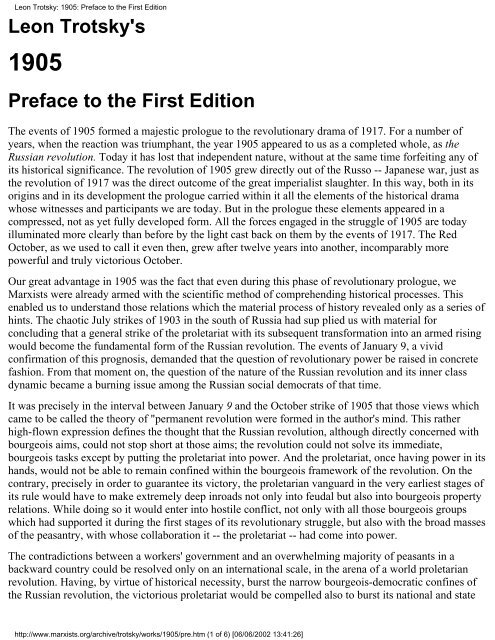Leon Trotsky: 1905
Leon Trotsky: 1905
Leon Trotsky: 1905
Create successful ePaper yourself
Turn your PDF publications into a flip-book with our unique Google optimized e-Paper software.
<strong>Leon</strong> <strong>Trotsky</strong>: <strong>1905</strong>: Preface to the First Edition<br />
<strong>Leon</strong> <strong>Trotsky</strong>'s<br />
<strong>1905</strong><br />
Preface to the First Edition<br />
The events of <strong>1905</strong> formed a majestic prologue to the revolutionary drama of 1917. For a number of<br />
years, when the reaction was triumphant, the year <strong>1905</strong> appeared to us as a completed whole, as the<br />
Russian revolution. Today it has lost that independent nature, without at the same time forfeiting any of<br />
its historical significance. The revolution of <strong>1905</strong> grew directly out of the Russo -- Japanese war, just as<br />
the revolution of 1917 was the direct outcome of the great imperialist slaughter. In this way, both in its<br />
origins and in its development the prologue carried within it all the elements of the historical drama<br />
whose witnesses and participants we are today. But in the prologue these elements appeared in a<br />
compressed, not as yet fully developed form. All the forces engaged in the struggle of <strong>1905</strong> are today<br />
illuminated more clearly than before by the light cast back on them by the events of 1917. The Red<br />
October, as we used to call it even then, grew after twelve years into another, incomparably more<br />
powerful and truly victorious October.<br />
Our great advantage in <strong>1905</strong> was the fact that even during this phase of revolutionary prologue, we<br />
Marxists were already armed with the scientific method of comprehending historical processes. This<br />
enabled us to understand those relations which the material process of history revealed only as a series of<br />
hints. The chaotic July strikes of 1903 in the south of Russia had sup plied us with material for<br />
concluding that a general strike of the proletariat with its subsequent transformation into an armed rising<br />
would become the fundamental form of the Russian revolution. The events of January 9, a vivid<br />
confirmation of this prognosis, demanded that the question of revolutionary power be raised in concrete<br />
fashion. From that moment on, the question of the nature of the Russian revolution and its inner class<br />
dynamic became a burning issue among the Russian social democrats of that time.<br />
It was precisely in the interval between January 9 and the October strike of <strong>1905</strong> that those views which<br />
came to be called the theory of "permanent revolution were formed in the author's mind. This rather<br />
high-flown expression defines the thought that the Russian revolution, although directly concerned with<br />
bourgeois aims, could not stop short at those aims; the revolution could not solve its immediate,<br />
bourgeois tasks except by putting the proletariat into power. And the proletariat, once having power in its<br />
hands, would not be able to remain confined within the bourgeois framework of the revolution. On the<br />
contrary, precisely in order to guarantee its victory, the proletarian vanguard in the very earliest stages of<br />
its rule would have to make extremely deep inroads not only into feudal but also into bourgeois property<br />
relations. While doing so it would enter into hostile conflict, not only with all those bourgeois groups<br />
which had supported it during the first stages of its revolutionary struggle, but also with the broad masses<br />
of the peasantry, with whose collaboration it -- the proletariat -- had come into power.<br />
The contradictions between a workers' government and an overwhelming majority of peasants in a<br />
backward country could be resolved only on an international scale, in the arena of a world proletarian<br />
revolution. Having, by virtue of historical necessity, burst the narrow bourgeois-democratic confines of<br />
the Russian revolution, the victorious proletariat would be compelled also to burst its national and state<br />
http://www.marxists.org/archive/trotsky/works/<strong>1905</strong>/pre.htm (1 of 6) [06/06/2002 13:41:26]















![tyf Enf=O=n]lgg](https://img.yumpu.com/47584932/1/190x245/tyf-enfonlgg.jpg?quality=85)

